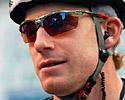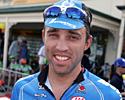News feature , December 22, 200
New entry into North American peloton
The North American peloton has undergone major changes for the 2008 season. After losing two key teams, Navigators and Kodak Gallery-Sierra Nevada and seeing Team Slipstream bring in more ProTour riders at the expense of slots of domestic riders, the job market has been a difficult place for riders seeking contracts. However, quietly in the corner, a new professional team was coming together: Team Type 1. Cyclingnews' Mark Zalewski discovers the unique paradigm which the new squad is based upon.
Team Type 1Professional team |
Team Type 1 is the newest entrant to the North American UCI ranks. Under the guidance of two veteran managers, Ed Beamon, formerly of the Navigators, and Tom Schuler, who has a long history of team management, from running the Colavita men's and women's teams last year going back to the Saturn dynasty, the team is quickly taking shape.
But what exactly is Team Type 1? In a bit of a departure from the normal product sponsor model, the team is named not for a product but for a cause: Type 1 diabetes, which several of its riders have lived with since childhood. The team is funded by pharmaceutical sponsors who make insulin and other products to help diabetics cope with their disease, but its mission is not to help sell those products but to sell a lifestyle.
"Our goal is to inspire people with diabetes around the world to take control of their health through diet, exercise and proper health care."- Team Type 1 co-founder Phil Southerland |
An elite amateur Team Type 1 which was made up from diabetic athletes who focused on extreme endurance races such as the Race Across America (RAAM) has existed for several years, but the squad is now being transformed into a new UCI continental team - comprised of many domestic professionals left team-less at the end of last season and a sprinkling of diabetic riders from the elite team who will step up to the pro ranks.
The operation is being run my Tom Schuler, whose Team Sports management company has had success in the past running programs like the unstoppable Saturn teams. "The project was in the works for over a year, but we just couldn't get it off the ground," Schuler told Cyclingnews. "It mostly focused on RAAM with some road racing. The founders are two of the most accomplished athletes with diabetes in the world, and they wanted to continue moving the team up the ranks, so having a continental team that has both athletes with and without diabetes, along with continuing the development of athletes and raising awareness.
The riders
The team will be comprised of a number of names familiar to the North American scene, but led on the road by Aussie Matt Wilson, a veteran of the European peloton. "This team is no gimmick," the 2007 Herald Sun Tour winner said. "These guys are the real deal. What they're able to do as athletes, despite diabetes, is remarkable."
"This is no gimmick, these guys are the real deal ."- Matt Wilson describes his diabetic team-mates |
Wilson himself knows something about fighting disease, having recovered from Hodgkin's lymphoma to continue racing in the Tour de France for Française des Jeux and most recently racing with the Unibet.com squad. He also has experience racing in America, racing as a stagiaire for Mercury-Viatel back in 2001.
A number of strong riders from various North American teams will make up the core of professional squad, including riders like Shawn Milne from Health Net, Ian MacGregor from Slipstream and Jesse Anthony (Kodak-Sierra Nevada). The four riders with diabetes joining the pro team will be the two founders Joe Eldridge and Phil Southerland, as well as New Zealand's Tim Hargrave and Australian Fabio Calabria.
Tip-top management
 |
While Schuler will be focused on logistics and operations, his specialty, the racing end of things, will be directed by another veteran - Ed Beamon, former manager of the Navigators Insurance team, which up until this year was the longest running team in North America. Beamon brings with him a number of key riders from Navigators, including New Zealand time trial champion, Glen Chadwick, Russian Valery Kobzarenko and Aussie sprinter Ben Brooks.
"When we hired Beamon it was much easier to talk to those guys," said Schuler. "We originally had Lagutin signed too but he got an offer in Europe. Ed has been keeping behind the scenes assembling the final roster - I already had a core signed and he helped get the three former Navigators and a few others. His real forte will be on the road."
The inclusion of an experienced director like Beamon - who is also bringing his assistant director and former ace sprinter Vasilli Davidenko - should make the team run smoother compared to Schuler's work this year managing the Colavita-Sutter Home teams. "I think I underestimated the scope of the job in terms of managing and directing," said Schuler. "I was too ambitious with the budget we had. We were racing better towards the end of the year, but I don't think we created the best environment we could have. I put all that on my shoulders alone."
"For next year we had set-up Colavita first, giving it the full attention - but then Team Type 1 came along and we decided to separate," said Schuler. "Things ended on a good note, and I really appreciate and admire John Profaci, how he contributes to racing in America."
The mission

|
By its very name and nature, this team is different, which is something that Schuler sees as its greatest business advantage, similar to how his Saturn team was run. In a way, Team Type 1 is a sort of proxy charitable organization, raising awareness as they race. The primary and secondary money for the team comes from the pharmaceutical industry dealing with diabetes medications.
"All of those companies want to have relationships with charities," said Schuler. "We are a little outside that but we will partner with those charitable organizations, so making it work on a localized level is really valued. With Saturn, the reason why it worked is not just because we won a lot of races, but we made it local. And this team is a natural for going to hospitals and into the community to show people that people with diabetes can succeed."
"As much of the focus will be on the riders with diabetes, both on the RAAM team and the professional team, the potential for building awareness and reaching out to the diabetic community with the team in general is a key too," Schuler said.
The team's focus will be primarily on the major races in North America, but the fact that diabetes is a problem world-wide means that the team will have a global focus as well. "We are going to do some outreach out of the country because it is a global epidemic," said Schuler. "It was finally recognized on November 18 last year for the first time by the United Nations. So we will take about two races in Europe, Latin America and Asia. Shawn Milne won the Tour of Taiwan last year, so that will be a good one to go to."
The additional of a professional team does not mean the success in RAAM will not be a target for 2008, as well as continued development of younger riders with diabetes. "We still want to try to defend the RAAM team category," said Schuler. "We'll have four returning and for new members for that team."

